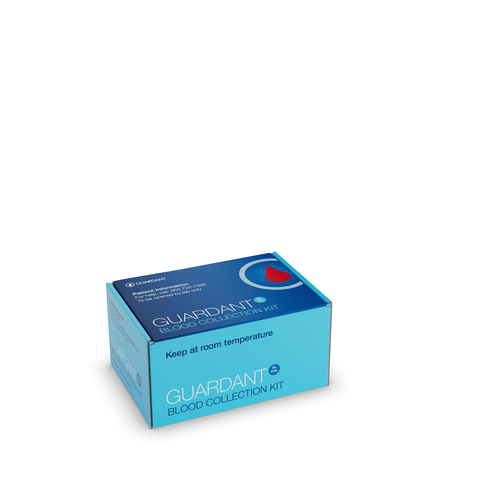Guardant Health ECLIPSE Study Data Demonstrating Efficacy of Shield Blood-based Test for Colorectal Cancer Screening to be Published in The New England Journal of Medicine
-
Study shows blood-based cancer screening test detects
83% of people with colorectal cancer with specificity of90% - Results pave the way for first potential FDA-approved blood test for colorectal cancer screening to meet requirements for Medicare coverage

Shield (TM) from Guardant Health is a blood test for colorectal cancer screening for adults age 45-84 who are at average risk. (Photo: Business Wire)
“Over 50 million eligible Americans do not get recommended screenings for colorectal cancer, partly because current screening methods are inconvenient or unpleasant,” said AmirAli Talasaz, Guardant Health co-CEO. “We believe the publication of the ECLIPSE study in The New England Journal of Medicine, one of the world’s leading medical journals, is an endorsement of the quality of our clinical data and the potential value of the Shield test. We are confident that offering an accurate blood test has the potential to significantly reduce preventable colorectal cancer deaths.”
One of the largest studies of its kind, ECLIPSE (Evaluation of ctDNA LUNAR Assay In an Average Patient Screening Episode) is a 20,000+-patient registrational study to evaluate the performance of Shield compared to a screening colonoscopy. The Shield test detects colorectal cancer signals in the bloodstream from DNA that is shed by tumors, called circulating tumor DNA (ctDNA).
Highlights of the study results to be published in The New England Journal of Medicine* show that Shield demonstrated:
-
83% sensitivity in detecting individuals with CRC -
88% sensitivity in detecting pathology-confirmed Stages I-III -
Sensitivity by stage of:
-
65% for pathology-confirmed Stage I;55% for clinical Stage I -
100% for Stage II -
100% for Stage III -
100% for Stage IV
-
These results are on par with the performance of other guideline-recommended non-invasive screening modalities, where overall sensitivity in detecting colorectal cancer ranges from
“More than 3 out of 4 Americans who die from colorectal cancer are not up to date with their recommended screening,2 highlighting the need for a more convenient and less invasive screening method that can overcome barriers associated with traditional options,” said Daniel Chung, MD, gastroenterologist at Massachusetts General Hospital and Professor of Medicine at Harvard Medical School. “The ECLIPSE study results published today support the use of a blood test as a screening option that could help overcome these barriers and improve CRC screening rates."
Publication of ECLIPSE follows Guardant Health’s submission of its premarket approval (PMA) application to the U. S. Food and Drug Administration (FDA) for Shield, which included key data points from the study. Since the launch of the lab-developed version of the Shield test in May 2022, it has been used by more than 20,000 people and more than
“Colorectal cancer is highly treatable if caught in the early stages, yet more than 50 million people in the
Colorectal cancer is the second-leading cause of cancer deaths in the
“The results of the study are a promising step toward developing more convenient tools to detect colorectal cancer early while it is more easily treated,” said corresponding author William M. Grady, MD, a gastroenterologist at Fred Hutchinson Cancer Center. “The test, which has an accuracy rate for colon cancer detection similar to stool tests used for early detection of cancer, could offer an alternative for patients who may otherwise decline current screening options."
* Representatives of the media who are not able to access the article content can contact press@guardanthealth.com.
About the ECLIPSE study
ECLIPSE is a prospective registrational study to evaluate the performance of Guardant Health’s blood test in detecting signs of CRC compared to a screening colonoscopy in average-risk adults between the ages of 45 and 84 from across the
About Shield
The Shield test for colorectal cancer screening is commercially available for eligible individuals by prescription only through healthcare professionals. This LDT (Laboratory Developed Test) is intended to be complementary to, and not a replacement for, current recommended CRC screening methods. A negative result does not rule out the presence of cancer. Patients with an abnormal blood-based screening result should be referred for a diagnostic colonoscopic evaluation.
More information about the Shield test is available at bloodbasedscreening.com.
About Guardant Health
Guardant Health is a leading precision medicine company focused on guarding wellness and giving every person more time free from cancer. Founded in 2012, Guardant is transforming patient care by providing critical insights into what drives disease through its advanced blood and tissue tests, real-world data and AI analytics. Guardant tests help improve outcomes across all stages of care, including screening to find cancer early, monitoring for recurrence in early-stage cancer, and helping doctors select the best treatment for patients with advanced cancer. For more information, visit guardanthealth.com and follow the company on LinkedIn, X (Twitter) and Facebook.
Forward-Looking Statements
This press release contains forward-looking statements within the meaning of federal securities laws, including statements regarding the potential utilities, values, benefits and advantages of Guardant Health’s liquid biopsy tests or assays, which involve risks and uncertainties that could cause the actual results to differ materially from the anticipated results and expectations expressed in these forward-looking statements. These statements are based on current expectations, forecasts and assumptions, and actual outcomes and results could differ materially from these statements due to a number of factors. These and additional risks and uncertainties that could affect Guardant Health’s financial and operating results and cause actual results to differ materially from those indicated by the forward-looking statements made in this press release include those discussed under the captions “Risk Factors” and “Management’s Discussion and Analysis of Financial Condition and Results of Operation” and elsewhere in its Annual Report on Form 10-K for the year ended December 31, 2023, and any current and periodic reports filed with or furnished to the Securities and Exchange Commission thereafter. The forward-looking statements in this press release are based on information available to Guardant Health as of the date hereof, and Guardant Health disclaims any obligation to update any forward-looking statements provided to reflect any change in its expectations or any change in events, conditions, or circumstances on which any such statement is based, except as required by law. These forward-looking statements should not be relied upon as representing Guardant Health’s views as of any date subsequent to the date of this press release.
Disclosures
Dr. Chung and Dr. Grady are paid members of Guardant Health’s ECLIPSE Steering Committee. Both advised on the design and procedure of the clinical study and data analysis.
References
-
Chung, D., et al. Clinical Validation of a Cell-Free DNA Blood-Based Test for Colorectal Cancer in an Average Risk Population. Abstract #3910067. Digestive Disease Week 2023; May 6-9, 2023;
Chicago, IL. - Gastroenterology. 2019 Jan; 156(1): 63–74.e6. www.ncbi.nlm.nih.gov/entrez/eutils/elink.fcgi?dbfrom=pubmed&retmode=ref&cmd=prlinks&id=30268788. Accessed March 6, 2024.
- Bretthauer M, Løberg M, Wieszczy P, et al.; NordICC Study Group. Effect of colonoscopy screening on risks of colorectal cancer and related death. N Engl J Med. 2022;387:1547-1556.
-
Knudsen AB, Rutter CM, Peterse EFP, et al. Colorectal cancer screening: An updated decision analysis for the
U.S. Preventive Services Task Force.Rockville (MD): Agency for Healthcare Research and Quality; 2021a. Report No.: 202s. - Imperiale TF, Ransohoff DF, Itzkowitz SH, et al. Multitarget stool DNA testing for colorectal-cancer screening. N Eng J Med. 2014.
- Coronado GD, Jenkins CL, Shuster E, et al. Blood-based colorectal cancer screening in an integrated health system: a randomised trial of patient adherence. Gut. Epub ahead of print:23 January 2024. doi:10.1136/gutjnl-2023-330980.
- American Cancer Society: Colorectal Cancer Key Statistics. www.cancer.org/cancer/colon-rectal-cancer/about/key-statistics.html Accessed online Feb 5, 2021.
- Colorectal Cancer Alliance. https://colorectalcancer.org/resources-support/community-support/young-onset-support/young-onset-crc-facts. Accessed March 13, 2024.
- Doubeni CA, Fedewa SA, Levin TR, et al. Modifiable Failures in the Colorectal Cancer Screening Process and Their Association With Risk of Death. Gastroenterology 2019;156:63–74.
-
U.S. Food & Drug Administration. 2022 Drug Trials Snapshots Summary Report. https://www.fda.gov/drugs/drug-approvals-and-databases/drug-trials-snapshots. Accessed December 18, 2023.
View source version on businesswire.com: https://www.businesswire.com/news/home/20240313547689/en/
Investor Contact:
investors@guardanthealth.com
Media Contact:
Michael Weist
press@guardanthealth.com
+1 650-647-3643
Source: Guardant Health, Inc.







